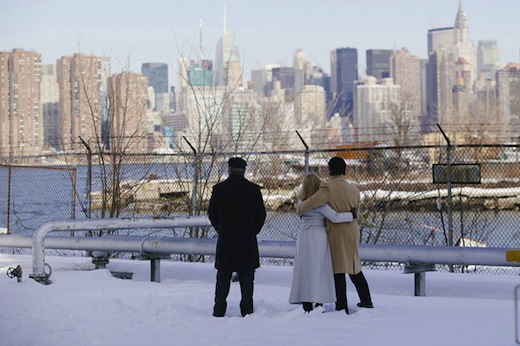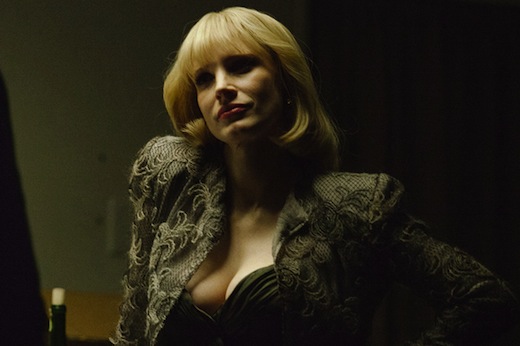A Most Violent Year is a riveting drama even though I can’t tell you what it’s about, or even what it actually is. (What’s new?) Set in New York City in 1981, against the improbable background that is the heating oil business (it’s sexier than you’d think), this isn’t quite a gangster film and it isn’t quite a thriller and it isn’t quite a morality play and it isn’t quite an exploration of the American Dream and it isn’t one of those parables about the evils of capitalism either. This is discombobulating, initially. We are used to the familiarity of well-defined genres. ‘Where is this going?’ you will keep asking yourself, whereas your best bet is simply to go with it, while admiring the coats. I will even stick my neck out and say there has never been a better film for coats than this.
Written and directed by J.C. Chandor (Margin Call) with a title referring to the fact that 1981 was New York’s most statistically violent year on record, this stars Oscar Isaac, an insanely charismatic actor who also, happily, happens to be rather hot. (Bottomless brown eyes; thick dark hair; a commanding presence even when doing nothing.) He plays Abel Morales, a first generation Columbian immigrant who started in the heating oil business as a truck driver and now owns the company. His coat is camel, beautifully cut, possibly cashmere, or at least a cashmere and wool mix. (I can’t know for sure without copping a feel; oh, I wish!)

Morales is an ambitious businessman, with plans, but is under pressure. Someone is hijacking his delivery trucks and beating up his drivers. The district attorney (David Oyelowo) is about to indict him for fraud. A property deal is threatened when the bank pulls out, and if he can’t raise the cash elsewhere, he’ll be left with nothing. Meanwhile, an armed prowler is discovered outside the family home; the modern steel and glass construction he shares with his wife Anna (Jessica Chastain). His wife is from a mob family. His wife is his ally and confidante but also chides him, Lady Macbeth-style, into being more manly, and if he can’t finish off the deer they’ve just hit in the car, she will. His wife wears killer Armani, including a full-length, wide-shouldered, pure white coat, cinched at the waist with what I believe is called a ‘statement belt’. These coats offer a fascinating subtext, if only I could work out what that subtext is. Perhaps they speak of power and wealth and control and how devastating it would be if they got dirty?

Morales, it turns out, wants to be the good guy; to keep it clean even though it’s a dog-eat-dog world out there. (Surprisingly dangerous, the heating oil world.) He refuses Anna’s offer of calling in her family for help. He meets with his competitors, whom he suspects of hijacking his trucks. ‘Just stop,’ he tells the table. ‘Take some pride in what you do.’ There is something of Al Pacino’s Michael Corleone about him. He speaks softly, formally, is never rattled, waits a beat before saying anything. He is fascinating to watch. His two-handers with Chastain crackle. A particular scene, where he teaches a new group of recruits how to sell his oil to householders, is entirely mesmerising. Yet, unlike any of the Corleones, he does not have the taste for violence and the film, despite its title, doesn’t have much of a taste for it either. There is one action sequence, but otherwise this is conducted at an almost funereal pace, against a washed-out, slushy New York of greys and browns and whites.
So, can Morales keep his honour? This is what drives the film, narratively, along with: how moral is he anyhow? Anna cooked their books, but with his knowledge, so what does that make him? Is the clue in the name, Morales? (No. Looked that up and it has its Spanish origins in living near a mulberry tree. Pity.) ‘You must,’ he ultimately tells the DA, who, it transpires, is similarly ambitious, ‘choose the path that is most right.’ So, nothing is absolute. I’m getting bogged down in meaning here which, in fact, is unnecessary, as whatever this is about, the journey makes it worthwhile, and always sustains our interest. Plus, it does great coat.
Got something to add? Join the discussion and comment below.
Get 10 issues for just $10
Subscribe to The Spectator Australia today for the next 10 magazine issues, plus full online access, for just $10.
You might disagree with half of it, but you’ll enjoy reading all of it. Try your first month for free, then just $2 a week for the remainder of your first year.













Comments
Don't miss out
Join the conversation with other Spectator Australia readers. Subscribe to leave a comment.
SUBSCRIBEAlready a subscriber? Log in